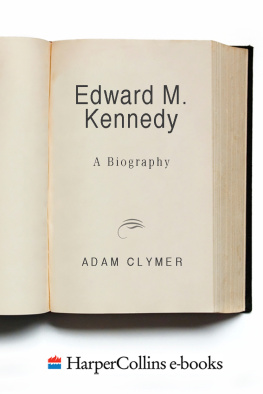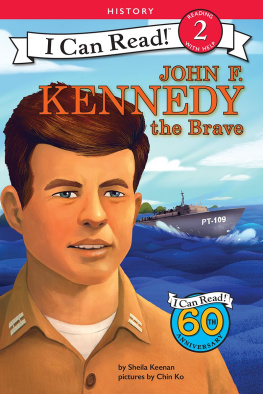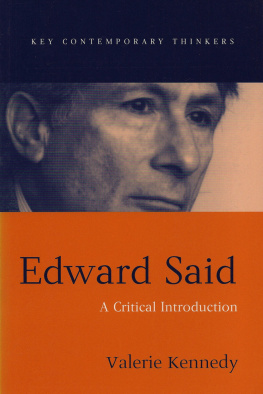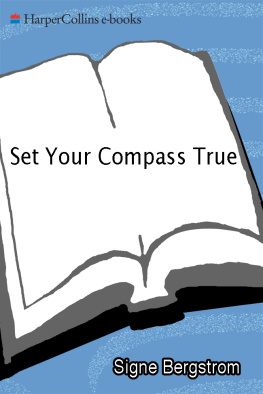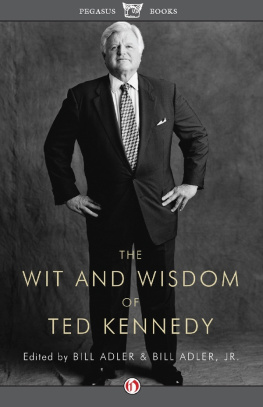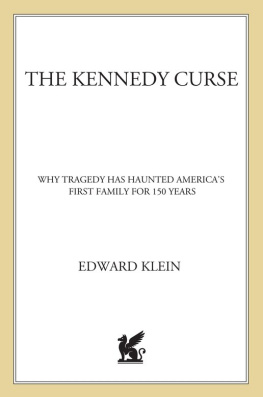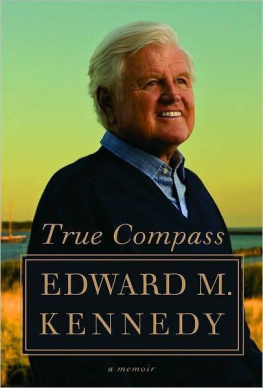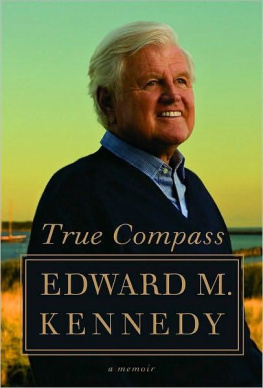Acknowledgments
The first time I covered Ted Kennedy, he was starting at left end for Harvard against Yale in 1955. The game was played in a blizzard. In the second quarter, with Yale leading, 140, he made a diving catch of a deflected pass for a touchdown. Harvard lost anyhow.
Over more than three decades with the Baltimore Sun and The New York Times, I have covered many of his successes and failures personallycivil rights and education bills that passed and national health insurance bills that did not, nominations that failed like Frank Morrisseys or that succeeded like Stephen Breyers, and elections he lost, like the run against Jimmy Carter in 1980, or won, like the victory over Mitt Romney in 1994. So occasionally the sourcing in this book will be my own memory.
But while I have used every newspaper morgue and Presidential library that had useful material, the backbone of the research for this book is more than four hundred interviews I have conducted over the last seven years. This book would not exist without the generous help of more than three hundred people. I have named almost all in the notes, though a few Senate aides, used to going nameless, insisted on anonymity. But, named or not, they all provided important facts, anecdotes, and insights.
Twenty-one of those interviews were with Senator Kennedy himself. He gave generously of his time and encouraged friends, relatives, and present and former aides to talk to me. He decided to cooperate without any certainty about what the book would say, other than to treat him as an important figure of his time, a major lawmakerusing the phrase literally. That is a view which has gained currency in recent years; it was hardly conventional when I started in 1992, shortly after Palm Beach and Clarence Thomas.
But from the first interview, on September 10, 1992, he raised one warning flag, saying that he would see, as time went on, how much he would talk about personal matters. That turned out, on May 28 of this year, to mean that he would not talk about Chappaquiddick. An aide said Kennedy found it too painful for him.
Dozens of friends helped in this work, in dozens of ways. Kathleen Hall Jamieson, dean of the Annenberg School of Communications at the University of Pennsylvania, is one who stands out. She offered a fellowship at the school in 1995, which enabled me to begin writing, and ever since has provided expertise and encouragement. I am also indebted to her associates Deborah Porter and Deb Williams, and two students who served as research associates, Meghin Adams and Paul Waldman.
Three sets of special friends have provided hospitality on trips to Boston and their own special insights over these years. They are Rick and Patty Stearns, Bill and Lynne Kovach, and Nick and Jenny Littlefield.
Librarians at many institutions went far beyond any normal professional obligations to help. They include Barclay Walsh, Monica Borkowski, and Marjorie Goldsborough at The New York Times; Will Johnston, Megan Desnoyers, and Stephen Plotkin of the John F. Kennedy Library; Mike Gillette of the Legislative Archive at the National Archives; Lisa Tuite and her staff at the Boston Globe; Richard Norton Smith at the Ronald Reagan Library; Regina Greenwell of the Lyndon Baines Johnson Library; Joan Horne of the El Centro (California) Public Library; and Greg Harness, Nancy Kervin, and Kimberly Edwards of the United States Senate Library. Other libraries where I have been greeted and helped with unremitting efficiency and good cheer include those at the Harvard Law School, the Boston Herald, the University of Texas at Austin, and the Minnesota State Historical Society, along with the Gerald R. Ford Library and the Bentley Library at the University of Michigan in Ann Arbor. And in Washington, of course, no research facility compares, despite inadequate federal spending, to the Library of Congress, and I have spent hours using its resources, especially the newspaper microfilm and manuscript collections.
Not all documents are in libraries, though, and it is a rare gift to have personal papers generously made available. I was privileged to see the papers belonging to Douglas Brinkley, Jim Cannon, Greg Craig, John Aloysius Farrell, Dun Gifford, Bob Healy, Nick Littlefield, Robert Mutch, Jeanus Parks, and Arthur Schlesinger.
Several friends read all or part of the manuscript. None bears any responsibility for its flaws, but all helped reduce them, and I valued the perspectives of Jill Abramson, Richard Baker, Barbara Bardes, Geraldine Baum, Linda Greenhouse, Jon Margolis, Mike Oreskes, Richard Stearns, and Robin Toner. Other friends whose insights and advice made it better include Caroline Rand Herron, James Carroll, and Tom Oliphant.
My colleagues at the Times have helped in too many ways to detail. Especially helpful have been Joe Lelyveld, Howell Raines, Johnny Apple, Andy Rosenthal, Robert Pear, Thom Shanker, Don Van Natta, Lizette Alvarez, Steve Greenhouse, Larry Altman, Stephen Crowley, Paul Hosefros, Justin Lane, Shana Raab, Mike Kagay, Marjorie Connelly, Janet Elder, John Files, Rebecca Knight, Renwick McLean, Melissa McNamara, and Sarah Smucker.
In Senator Kennedys office itself I knew I could count on the staff to find time for me on even the busiest crowded days, starting with Ranny Cooper and Paul Donovan, who helped at the beginning and moved on but continued to help, and Carey Parker, Melody Miller, and David Nexon, who stayed and continued to help. Jim Manley, the Senators current press secretary, has never failed to find things and arrange things in the last hectic months, and this project has always leaned heavily on the press aides, especially Pam Hughes, Theresa Bourgeois, Lorrie McHugh, Kathy McKiernan, Lisa Brenner, Matt Ferragutto, and Will Keyser. While I was helped by dozens of former Kennedy aides (a description about as real as ex-Marine), David Burkes constant availability and thoughtful guidance stand out.
When the manuscript was completed, I suddenly had to become a picture editor, choosing photographs for the book. I managed that only with the help of Jean Shiner and Raina Filip at the Boston Globe, Phyllis Collazo and Marilyn Cervino at New York Times Syndication Sales, Don Bowden at AP/Wide World, Kathy-Ann Williams at Corbis-Bettmann, Allyson Whyte at Camera 5, Alan Goodrich at the Kennedy library, Philip Scott at the Johnson library, Josh Tenenbaum at the Reagan library, David Lombard at the CBS Photo Archive, and Kimberly Oster at the Washington Post Writers Group.
Without taking pages to describe what each of them did, I also want to thank Camille Balletto, Christopher Beam, Nancy Bertrand, Chris Black, Bob Boorstin, Tom Brokaw, Paul Claussen, Loretta Crane, Sam Donaldson, Tom Donilon, Tom Dwyer, Neill Edwards, Kathleen Frankovic, Eric Kocher, Josh Lahey, Joe Laurano, Lorne Michaels, Robert November, Bob Pastor, Dan Rather, Tim Russert, Don Ritchie, Dot Rogers, Margaret Roman, Julie Rovner, Bob Schieffer, Mike Shoemaker, Greg Stevens, Matt Storin, George Watson, and Keith White. Their contributions helped in so many different ways.
Liz Perle, then of Addison-Wesley and later with Morrow, bought the book at a time when other publishers were asking why a Kennedy book would not be about sex. Her confidence was reassuring.
A newspaperman is often suspicious of editorseven if he has been one himself. Henry Ferris not only allayed those fears, as he edited this book, but offered encouragement and experience. He did what editors always hope to do. He made the story better.
David Black, my dynamic agent, was not only a pathfinder in the mysterious ways of the book business but a creative colleague in this enterprise, helping conceive and organize it. He persisted despite my disproving one of his early, cheery assumptions (comparable to his annual hopes for the Knicks), the idea that newspaper reporters are very good at making book deadlines. He is a great friend.

